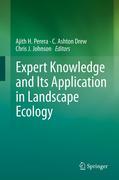
Expert knowledge and its application in landscapeecology
Perera, Ajith H.
Drew, C. Ashton
Johnson, Chris J.
Typically, landscape ecologists use empirical observations to conduct research and devise solutions for applied problems in conservation and management. Insome instances, they rely on advice and input of experienced professionals inboth developing and applying knowledge. Given the wealth of expert knowledge and the risks of its informal and implicit applications in landscape ecology, it is necessary to formally recognize and characterize expert knowledge and bring rigor to methods for its applications. In this context, the broad goal of this book is to introduce the concept of expert knowledge and examine its rolein landscape ecological applications. We plan to do so in three steps: First we introduce the topic to landscape ecologists, explore salient characteristics of experts and expert knowledge, and describe methods used in capturing and formalizing that knowledge. Second, we present examples of research in landscape ecology from a variety of ecosystems and geographic locations that formallyincorporate expert knowledge. These case studies address a range of topics that will interest landscape ecologists and other resource management and conservation professionals including the specific roles of expert knowledge in developing, testing, parameterizing, and applying models; estimating the uncertainty in expert knowledge; developing methods of formalizing and incorporating expert knowledge; and using expert knowledge as competing models and a source of alternate hypotheses. Third, we synthesize the state of knowledge on this topic and critically examine the advantages and disadvantages of incorporating expert knowledge in landscape ecological applications. The disciplinary subject areas we address are broad and cover much of the scope of contemporary landscape ecology, including broad-scale forest management and conservation, quantifying forest disturbances and succession, conservation of habitats for a range ofavian and mammal species, vulnerability and conservation of marine ecosystems, and the spread and impacts of invasive plants. This text incorporates the collective experience and knowledge of over 35 researchers in landscape ecology representing a diverse range of disciplinary subject areas and geographic locations. Through this text, we will catalyze further thought and investigations on expert knowledge among the target readership of researchers, practitioners,and graduate students in landscape ecology. Incorporates the collective experience and knowledge of over 35 researchers in landscape ecology representing a diverse range of disciplinary subject areas and geographic locations. Introduces the concept of expert knowledge and examine its role in landscape ecological applications. Case studies address a range of topics that will interest landscape ecologists and other resource management and conservation professionals. INDICE: Foreword. Acknowledgements. List of Contributors. 1. Experts, expert knowledge, and their roles in landscape ecological applications. 2. What isexpert knowledge, how is such knowledge gathered, and how do we use it to address questions in landscape ecology?. 3. Elicitator : a user-friendly, interactive tool to support scenario-based elicitation of expert knowledge. 4. Eliciting expert knowledge of forest succession using an innovative software tool. 5. Expert knowledge as a foundation for the management of secretive species andtheir habitat. 6. Incorporating expert knowledge in decision-support models for avian conservation. 7. An expert-based modeling approach to inform strategic and operational land management decisions for the recovery of woodland caribou. 8. Using expert knowledge effectively: lessons from species distribution models for wildlife conservation and management. 9. Exploring expert knowledge of forest succession: an assessment of uncertainty and a comparison with empirical data. 10. Assessing knowledge ambiguity in the creation of a model based on expert knowledge and comparison with the results of a landscape succession model in central Labrador.- 11. Use of expert knowledge to develop fuel maps for wildland fire management. 12. Using Bayesian mixture models that combine expert knowledge and GIS data to define ecoregions. 13. Eliciting expert knowledge of ecosystem vulnerability to human stressors to support comprehensive ocean management. 14. Elicitation and use of expert knowledge in landscape ecological applications: a synthesis. Index.
- ISBN: 978-1-4614-1033-1
- Editorial: Springer New York
- Encuadernacion: Cartoné
- Páginas: 300
- Fecha Publicación: 28/12/2011
- Nº Volúmenes: 1
- Idioma: Inglés
